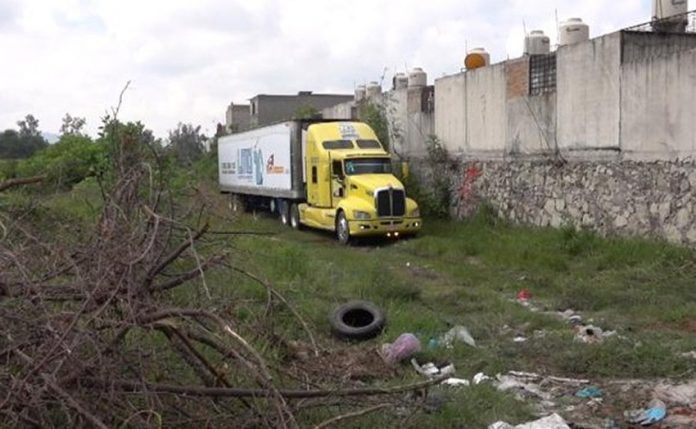Finding a suitable place to park a trailer containing 157 unidentified bodies is proving to be a difficult task for authorities in Jalisco.
Due to a lack of space in state-run morgues, the Jalisco Institute of Forensic Sciences (IJCF) placed the corpses in a refrigerated trailer that until last Thursday was left in a warehouse in La Duraznera, a neighborhood in the municipality of Tlaquepaque.
But after residents complained of fetid odors, Mayor María Elena Limón ordered the state government to remove the trailer from Tlaquepaque, setting a period of 48 hours within which to do so.
Limón also said that municipal authorities were not notified by their state counterparts of the decision to store the corpse-filled container in Tlaquepaque, which is part of the Guadalajara metropolitan area.
The state government complied with the mayor’s order, moving the trailer to a litter-strewn property in the municipality of Tlajomulco de Zúñiga, where it was left outdoors directly behind the Paseos del Valle housing estate.
But that only achieved to transfer the same problem from one place to another.
Soon after the trailer’s relocation, Paseos del Valle residents also began to complain about offensive smells, some even claiming that blood was spilling out of the container. Some threatened to set it on fire.
Tlajomulco authorities, like those in Tlaquepaque, said they hadn’t been informed either of the plan to park the makeshift morgue within municipal limits. They too asked for it to be removed.
Consequently, on Saturday the state government once again relocated the morgue-on-wheels, this time leaving the 157 bodies in a warehouse belonging to the state Attorney General’s office (FGE) in an industrial area of Guadalajara.
In response to the situation, the Jalisco Human Rights Commission (CEDHJ) has initiated an investigation and reminded the IJCF that in accordance with established protocols it is required to establish a forensic cemetery where unclaimed bodies held by state authorities can be buried.
Before burial, DNA samples must be collected from all the victims, the CEDHJ said.
“The graves or burial niches must be marked using durable materials with the file number . . . that corresponds to the remains. All the information about the burials must be duly documented and added to both the State Bank of Forensic Data and the case file in the Attorney General’s office,” the organization said.
State authorities last month began the construction of a forensic cemetery on land donated by the municipality of Tonalá but work quickly stalled due to complaints by neighbors.
However, Jalisco Interior Secretary Roberto López Lara said the graveyard will be ready by the end of next month and will have the capacity for the burial of around 700 bodies in its first stage.
The 157 bodies currently stored in the refrigerated trailer are victims of violent crime presumably at the hands of members of organized crime groups.
There have been more than 1,500 homicides in Jalisco to date this year, a figure that has already exceeded the total number of murders in the state during all of last year.
The Jalisco New Generation Cartel, considered Mexico’s most powerful and dangerous criminal organization, is believed to be behind much of the violent crime committed in the state.
Source: El Universal (sp), El Financiero (sp)
